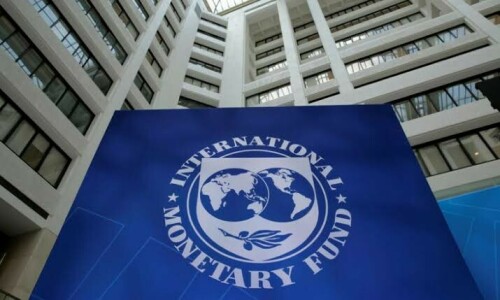ISLAMABAD: As part of efforts to regain some of the fiscal space lost under the 7th National Finance Commission to provinces almost 15 years ago, the federal government has signed agreements with the four provinces to deliver a cumulative fiscal surplus of at least Rs600 billion and refrain from creating further debt in operations of key commodities like fertiliser, wheat and other eatables until the close of this fiscal year in June.
This development has been reported to the International Monetary Fund (IMF) by the Ministry of Finance to highlight the collaborative efforts to adhere to stringent fiscal discipline.
The first quarter of the fiscal year (July-September 2023) witnessed a modest combined surplus of Rs51bn from the provinces, with Punjab and Khyber Pakhtunkhwa actually overspending instead of making efforts for fiscal restraint and thus facing deficits of Rs29bn and Rs10bn, respectively. In contrast, Sindh and Balochistan reported surpluses of Rs19bn and Rs71bn.
However, over the next quarter (October-December), the federal government pushed the provinces under the IMF programme and was able to secure about Rs290bn surplus from the provinces — Rs100bn from Sindh, Rs97bn from Balochistan, Rs49bn from KP, and Rs43bn from Punjab.
Finance ministry tells IMF improved fiscal coordination with provinces will help meet their FY24 budget targets
The Ministry of Finance has now reported to the IMF that it had improved fiscal coordination with the provincial governments through updated MOUs, which will help guarantee their budget targets this fiscal year (FY24).
“Furthermore, the Punjab government has committed, through its MOU, to curtail its expenditure by Rs115bn for the remainder of FY24 to achieve the committed surplus associated with the FY24 budget,” the ministry said.
Also, it said the “provincial governments have agreed to rectify the decade-long accumulation of commodity debts (created by provincial food departments outside the government’s fiscal perimeter) by implementing time-bound plans for the timely retirement of this debt”.
Additionally, the provinces have now committed to refraining from increasing their commodity debt and adopting a definition of provincial surpluses according to the Government Finance Statistics Manual (GFSM2014).
The manual is an IMF reporting template for all its members for various combinations of entities in a country involved in the functions of governments, including states, provinces, local or any sort of sub-national governments, including state-owned corporations and entities.
The IMF also recently confirmed that despite strong efforts by the federal government, additional measures were still needed to ensure the primary surplus goal of Rs400bn budgeted for the current fiscal year.
The Fund’s staff noted that while the federal government had contained spending, provincial current spending increased 57pc year on year, partly explained by the Punjab provincial government payment of Rs115bn related to commodity transactions, while development spending increased 61pc year on year.
“To ensure that provincial governments remain within their initial budget plans, the provinces have amended their (MOUs) signed with the federal government to include the estimated federal revenue, annual provincial revenue, and total expenditure plans, in line with the agreed surplus,” the IMF confirmed.
It added that the Punjab government had committed through a supplemental MOU to restrict its spending in the remainder of fiscal 2024 by Rs115bn to achieve a surplus of Rs336bn as committed in the MOU associated with this fiscal year’s budget.
As part of the effort, the government requested the IMF for technical assistance to strengthen budget preparation and execution and improve coordination and fiscal reporting with the provinces. This is expected to help critically strengthen the process ahead of the next year’s budget (2024-25).
The recently completed Climate-Public Investment Management Assessment (C-PIMA) also provides an action plan to strengthen public investment management to tackle climate challenges over the period ahead.
In addition, the four provinces have also signed up to a system of electronic procurement — e-Pakistan Acquisition and Disposal System (e-PADS) of the federal Public Procurement Regulatory Authority (PPRA) developed with the support of the World Bank to enhance transparency in all public procurement.
The e-PADS was launched early last year and since then, out of the 912 planned procurement contracts in the e-PADS system, 341 contracts have been completed.
The federal government is also working with the provinces to reduce electricity subsidies, including on tube wells, as it considers these subsidies primarily benefiting large agricultural users.
Published in Dawn, February 5th, 2024














































Dear visitor, the comments section is undergoing an overhaul and will return soon.